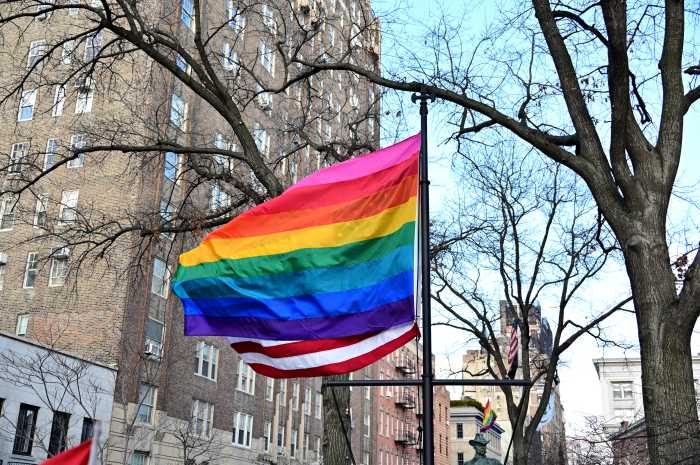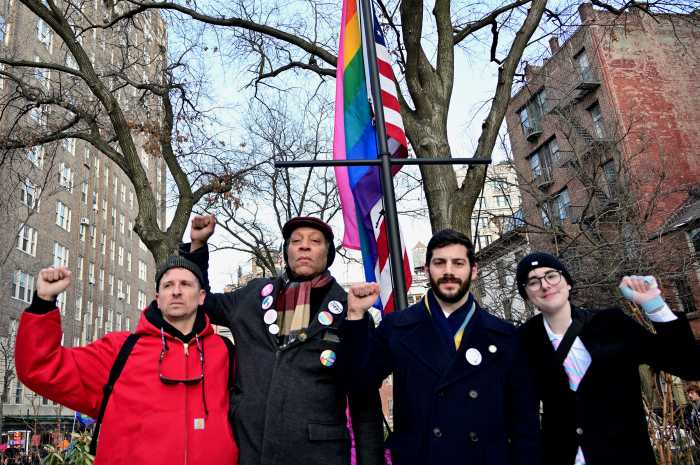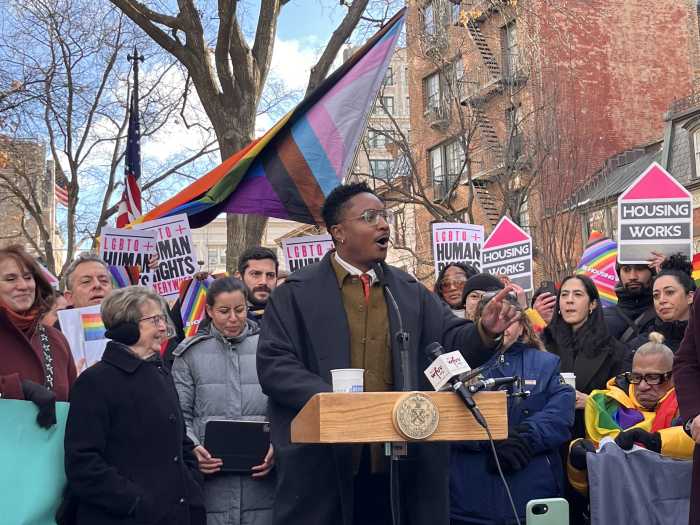Ballot proposal backed by mayor garnering little vocal LGBT support
In the City Council elections on Tuesday, November 4, in which only one of the 51 seats—that vacated by the July assassination of Brooklyn’s James Davis—is seriously contested, voters will also decide whether to approve a city charter proposal, strongly backed by Mayor Michael Bloomberg, to eliminate party primaries in municipal elections and replace them with non-partisan preliminary and run-off contests.
Gay and lesbian political leaders, many of whom have worked for years to bring about change within the local Democratic Party, are largely opposed to the referendum, but at least one, Aubrey Lees, an activist involved in gay and other Democratic clubs, has voiced strong support for the measure.
Several leading queer political organizations outside the Democratic Party structure—including the Empire State Pride Agenda, the New York City chapter of the Log Cabin Republicans, and the Out People of Color Political Action Club (Out POC PAC)—have sidelined themselves on this question.
“I am certainly encouraging people to vote no,” said City Councilmember Philip Reed, an out gay African American strongly expected to prevail in his re-election bid in Upper Manhattan and a small portion of the South Bronx. ”I’ve spent a lot of time thinking about it. I cannot make the argument that this would increase turnout and or quote unquote minority turnout. I’ve seen no evidence of it. No one’s provided any empirical data.”
Reed was referring to arguments made by proponents of non-partisan elections that eliminating party primaries, particularly in cities like New York where the Democratic Party predominates, increases participation by voters, Democratic and otherwise, in preliminary elections and makes final elections more competitive. More than 80 of the 100 most populous cities in the U.S., including Los Angeles and Chicago, now have non-partisan municipal elections, and advocates of the ballot measure argue that people of color candidates in those cities have had greater electoral success than in New York.
Opponents of the Bloomberg plan say that the data coming out of other cities is conflicting and that many comparisons fail to account for changing demographics, the passage of time, and other key factors.
Margarita Lopez, an out lesbian councilmember who represents the Lower East Side and also faces what is considered nominal opposition on Tuesday, was particularly critical of the argument that people of color communities would do better under non-partisan elections.
“Those in favor of this measure are using communities of color that are growing when they argue that they get better representation,” she said, referring to the experience of other cities. “Just like here where there are growing numbers of people of color on the Council.”
In fact, Lopez asserted, non-partisan elections are a reaction to the increasing influence of people of color in city politics across the nation.
“In those places where people of color communities are growing,” she said, “two things always come in—nonpartisan elections and term limits. We already have term limits and I believe that it is not an accident that we don’t have a proposition for nonpartisan elections for Congress and the Senate and we don’t have propositions for term limits for Congress and the Senate.”
Other groups that have gone on record against the ballot measure echo Lopez’s view that it would hurt communities of color. A print advertisement funded by the Gay and Lesbian Independent Democrats, the Downtown Independent Demo-crats, the Village Reform Democratic Club, and the Lower Manhattan Alliance for Progressive Political Action argues that the proposal would “dilute minority voting power,” a reference to the active role that African Americans and Latinos increasingly play in local Democratic politics. The Stonewall Democrats, also in a print ad, assert that the measure “would harm the rights of all minorities, including all People of Color, Religious, and LGBT communities.”
Mark Tyler is an out gay man on leave from the city’s Law Department working for the Charter Reform Commission, which was appointed by Bloomberg and put the proposal on the ballot after holding hearings this summer. Appearing in support of the non-partisan measure last week at a meeting of Brooklyn’s Lambda Independent Democrats, an LGBT club, Tyler argued that its passage could not help but increase voter turnout and cited the increasing tendency of new voters to not register with a particular political party choice. In an interview after his Lambda appearance, Tyler said he was a registered Democrat who has worked for the city since before Bloomberg’s election, but he questioned how much good the current system is doing for communities of color.
“They have not stood up on health care, and they have not stood up on affirmative action,” he said, referring to the Democrats.
Doug Robinson, a longtime African American gay activist who helped found Out POC PAC, voiced uncertainty about the potential impact of non-partisan voting on people of color communities.
“I don’t know. I’ve heard both sides of the argument and have not made up my mind,” he said. “It appears to me that there is not enough data. If we adopted this, everyone would have to work to make sure their candidate gets their message out.”
The debate over minority turnout and electability has been the fulcrum of the non-partisan battle in recent months, but opponents of the measure argue more generally that advocates are drawing conclusions unwarranted by limited data. In a recent televised debate between City Council Speaker Gifford Miller and Dr. Fred Siegal, an historian at Cooper Union, Siegal asserted that cities with non-partisan elections were not experiencing the fiscal crises that have beset New York twice in the past 25 years. At a press briefing Miller called with Manhattan reporters several later, the Speaker termed the assertion “ridiculous.”
“I could just as easily argue that none of the cities with non-partisan elections have a crime rate as low as New York’s,” he said.
Miller made a point of mentioning that Bloomberg, in his effort to enact non-partisan voting, enjoys the support of Lenora Fulani, a perennial fringe political character with a history of inflammatory comments who is now aligned with New York’s Independence Party. Democrats opposing the measure–– from Reed to Assemblymember Denny Farrell, the New York State Democratic Party chair––repeatedly invoke Fulani’s name.
Another issue that has become a lightning rod in the non-partisan debate is the money that Bloomberg is spending to push the ballot measure. In the weeks after the Charter Commission made its recommendation in August, Bloomberg and the Democrats observed an unofficial détente, with neither side making an obvious show of big expenditures. In the past couple of weeks, however, mass mailings, funded in part with Bloomberg money but not bearing his name, have arrived in voters’ mailboxes.
The mayor’s more aggressive advocacy of his position on the ballot question has Democrats crying foul, even though they have long expected to spend money themselves. Several weeks ago, Christine Quinn, an out lesbian city councilmember who serves Manhattan’s West Side from the Village to Clinton, held a fundraiser in opposition to the ballot initiative. Quinn, who like Reed and Lopez faces only token opposition next week, did not respond to Gay City News’ request for comment on the spending contest.
According to Alan Fleishman, a Park Slope Democratic district leader long affiliated with Lambda, his club’s opposition to the Bloomberg initiative should come as no surprise. Responding to Tyler’s presentation to the club last week, Fleishman said, “The problem you have here is that this is an organization that for more than 20 years has worked to have an impact on the Democratic Party and we feel we are having an impact.”
He cited his election as an out gay district leader and the election of out queer judges in the borough.
Aubrey Lees, an out lesbian who has also served as a district leader, in Manhattan, and is active with both the Stonewall Democrats and the Village Independent Democrats, scoffed at the notion efforts at reforming the Democratic Party from the inside are paying off.
“I support political clubs,” she said. “But all the clubs I’m involved with are not that that interested in reforming the party. Just being part of the clubs, I don’t get that much support for reform. I get very frustrated. Maybe reform was important in the past, but not now.”


































